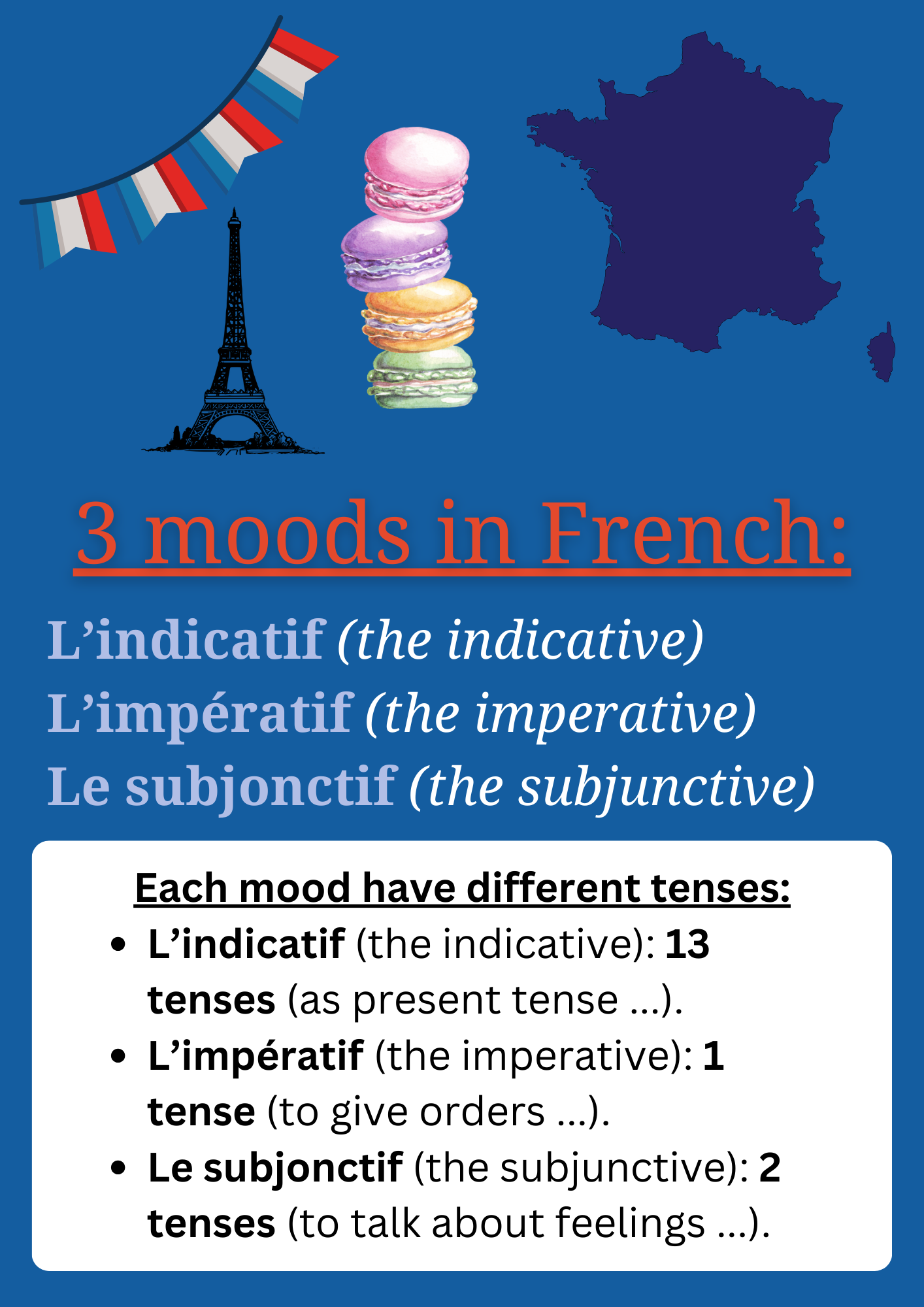Prepare your French Leaving Cert, here are some tips that will help you!
To improve your written and oral skills, knowing the different moods and tenses in French is the key.
Mastering the difficulties of the French language is a vital asset for any student navigating the French Leaving Certificate. A comprehensive grasp of grammar, moods, and tenses forms the bedrock of success.
Understanding the nuances of the French language will improve your written and oral proficiency but will also help with the foundation for confidence when you’re trying to communicate in a different language.
In this blog post, we’ll dig into essential tips to improve the understanding of different moods and tenses. Lets go!

1. L’indicatif (indicative) : 13 tenses
1) Le présent de l’indicatif (present tense):
Je parle = I speak / I do speak / I am speaking.
2) Le présent progressif (present continuous): être au présent + infinitif du verbe :
Je suis en train de parler = I am speaking
3) Le futur antérieur (future perfect):
J’aurai parlé = I will have spoken
– You put the auxiliar “avoir” or “être” in the future tense + the past participle of the verb.
4) Le futur proche (near future):
Je vais parler = I am going to speak
– You put the verb “aller” in the present tense + the verb in the infinitive.
5) Le futur simple (simple future):
Je parlerai = I will speak
6) Le conditionnel passé (past conditional):
J’aurais parlé = I would have spoken
-You put the auxiliar “avoir” or “être” in the conditional tense + the past participle of the verb.
7) Le conditionnel présent (present conditional):
Je parlerais = I would speak
8) Le passé récent (recent past):
Je viens de parler = I just spoke
– You put the expression “venir de” in the present tense + the verb in the past tense
9) Le passé composé (past tense):
J’ai parlé = I spoke / I have spoken
– You put the auxiliar “avoir” or “être” in the present tense + the past participle of the verb.
10) Le plus-que-parfait (pluperfect / past perfect):
J’avais parlé = I had spoken
– You put the auxiliar “avoir” or “être” in the imperfect + the past participle of the verb.
11) L’imparfait (imperfect):
Je parlais = I was speaking
12) Le passé simple (past historic / preterit):
Je parlai = I spoke
13) Le passé antérieur (past anterior):
J‘eus parlé = I had spoken
2. L’impératif (imperative): 1 tense
1) L’impératif présent (present imperative).
The imperative is used to:
Give an order / express a desire / make a request / offer advice / recommend something
–Parle avec elle = speak with her
3. Le subjonctif (subjunctive): 2 tenses
1)Le subjonctif présent (present subjunctive)
The subjunctive is a mood which expressing wish, hope, fear, uncertainty, and other attitudes or feelings toward a fact or an idea.
Often, 2 different people are involved: the first one wanting/hoping/ fearing… that the other one does something.
Sometimes, it is an expression which is followed by the subjunctive, such as “il faut que”.
Je veux que tu parles avec lui = I want you to speak to him.
2)Le subjonctif passé (past subjunctive)
Je ne crois pas qu’il lui ait parlé = I don’t think he talked to him.
-You put the auxiliar “avoir” or “être” in the subjunctive present + the past participle of the verb.
Remember, practice makes perfect. With improved written and oral skills plus a solid grasp of moods and tenses, you’ve got this!
Stay tuned, because we’ll keep sharing more invaluable tips to help you improve your French, German, and Spanish language skills here at www.elc.ie .

